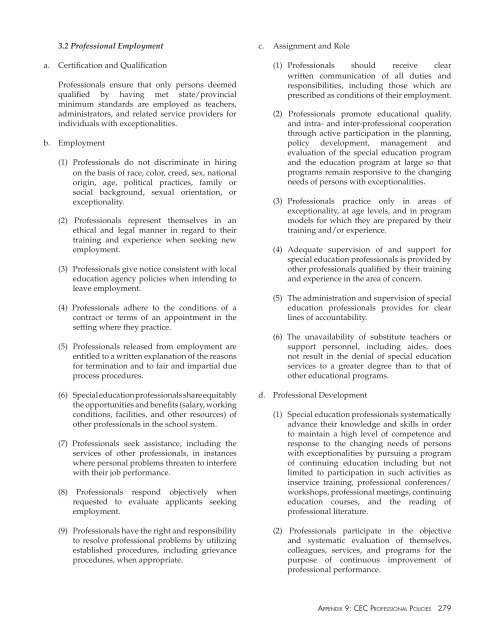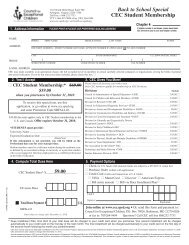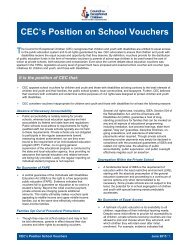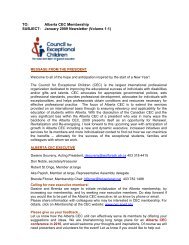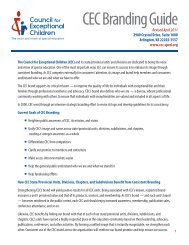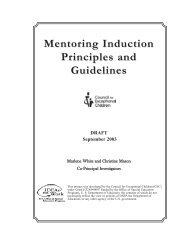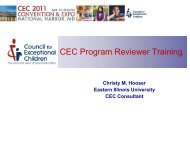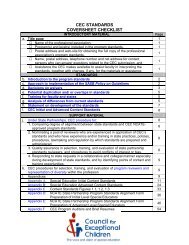What Every Must Know Special Educator - Council for Exceptional ...
What Every Must Know Special Educator - Council for Exceptional ...
What Every Must Know Special Educator - Council for Exceptional ...
You also want an ePaper? Increase the reach of your titles
YUMPU automatically turns print PDFs into web optimized ePapers that Google loves.
3.2 Professional Employment<br />
a. Certification and Qualification<br />
Professionals ensure that only persons deemed<br />
qualified by having met state/provincial<br />
minimum standards are employed as teachers,<br />
administrators, and related service providers <strong>for</strong><br />
individuals with exceptionalities.<br />
b. Employment<br />
(1) Professionals do not discriminate in hiring<br />
on the basis of race, color, creed, sex, national<br />
origin, age, political practices, family or<br />
social background, sexual orientation, or<br />
exceptionality.<br />
(2) Professionals represent themselves in an<br />
ethical and legal manner in regard to their<br />
training and experience when seeking new<br />
employment.<br />
(3) Professionals give notice consistent with local<br />
education agency policies when intending to<br />
leave employment.<br />
(4) Professionals adhere to the conditions of a<br />
contract or terms of an appointment in the<br />
setting where they practice.<br />
(5) Professionals released from employment are<br />
entitled to a written explanation of the reasons<br />
<strong>for</strong> termination and to fair and impartial due<br />
process procedures.<br />
(6) <strong>Special</strong> education professionals share equitably<br />
the opportunities and benefits (salary, working<br />
conditions, facilities, and other resources) of<br />
other professionals in the school system.<br />
(7) Professionals seek assistance, including the<br />
services of other professionals, in instances<br />
where personal problems threaten to interfere<br />
with their job per<strong>for</strong>mance.<br />
(8) Professionals respond objectively when<br />
requested to evaluate applicants seeking<br />
employment.<br />
(9) Professionals have the right and responsibility<br />
to resolve professional problems by utilizing<br />
established procedures, including grievance<br />
procedures, when appropriate.<br />
c. Assignment and Role<br />
(1) Professionals should receive clear<br />
written communication of all duties and<br />
responsibilities, including those which are<br />
prescribed as conditions of their employment.<br />
(2) Professionals promote educational quality,<br />
and intra- and inter-professional cooperation<br />
through active participation in the planning,<br />
policy development, management and<br />
evaluation of the special education program<br />
and the education program at large so that<br />
programs remain responsive to the changing<br />
needs of persons with exceptionalities.<br />
(3) Professionals practice only in areas of<br />
exceptionality, at age levels, and in program<br />
models <strong>for</strong> which they are prepared by their<br />
training and/or experience.<br />
(4) Adequate supervision of and support <strong>for</strong><br />
special education professionals is provided by<br />
other professionals qualified by their training<br />
and experience in the area of concern.<br />
(5) The administration and supervision of special<br />
education professionals provides <strong>for</strong> clear<br />
lines of accountability.<br />
(6) The unavailability of substitute teachers or<br />
support personnel, including aides, does<br />
not result in the denial of special education<br />
services to a greater degree than to that of<br />
other educational programs.<br />
d. Professional Development<br />
(1) <strong>Special</strong> education professionals systematically<br />
advance their knowledge and skills in order<br />
to maintain a high level of competence and<br />
response to the changing needs of persons<br />
with exceptionalities by pursuing a program<br />
of continuing education including but not<br />
limited to participation in such activities as<br />
inservice training, professional conferences/<br />
workshops, professional meetings, continuing<br />
education courses, and the reading of<br />
professional literature.<br />
(2) Professionals participate in the objective<br />
and systematic evaluation of themselves,<br />
colleagues, services, and programs <strong>for</strong> the<br />
purpose of continuous improvement of<br />
professional per<strong>for</strong>mance.<br />
Appendix 9: CeC profeSSionAl poliCieS 279


